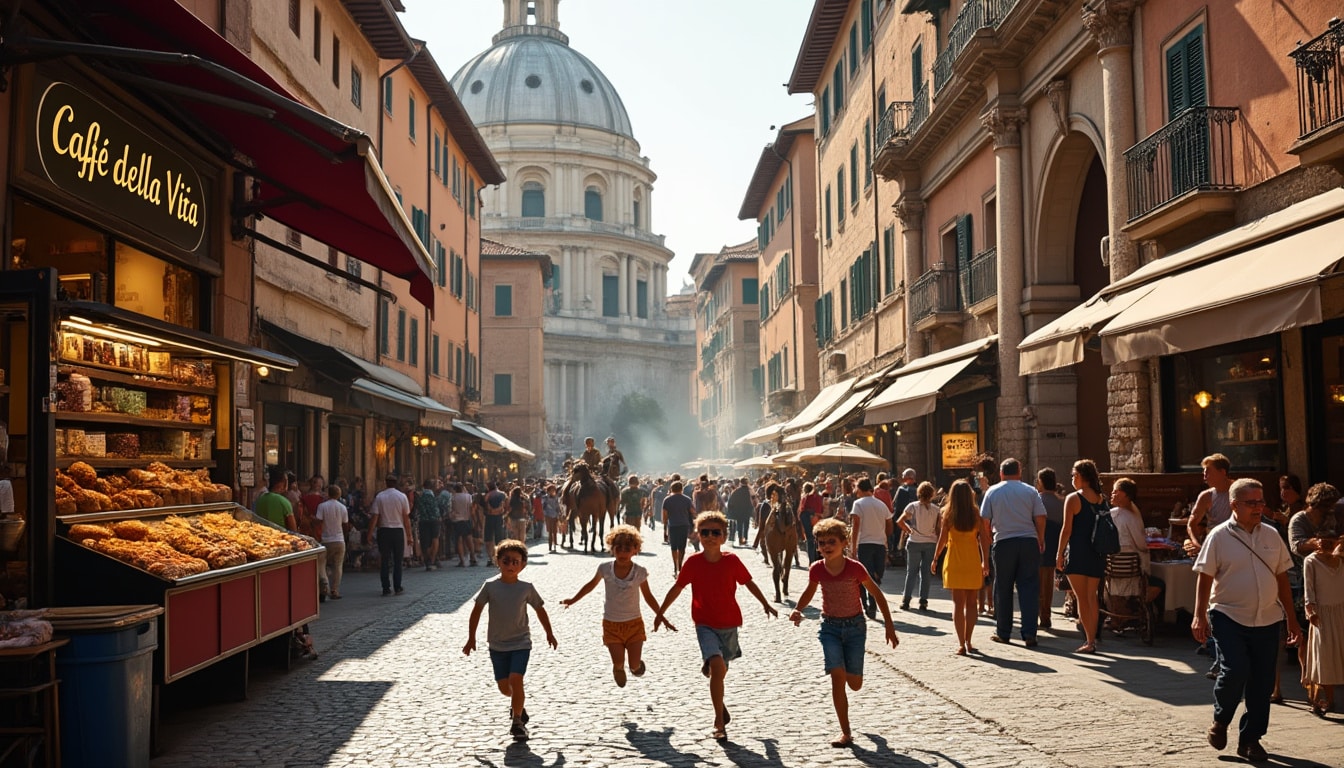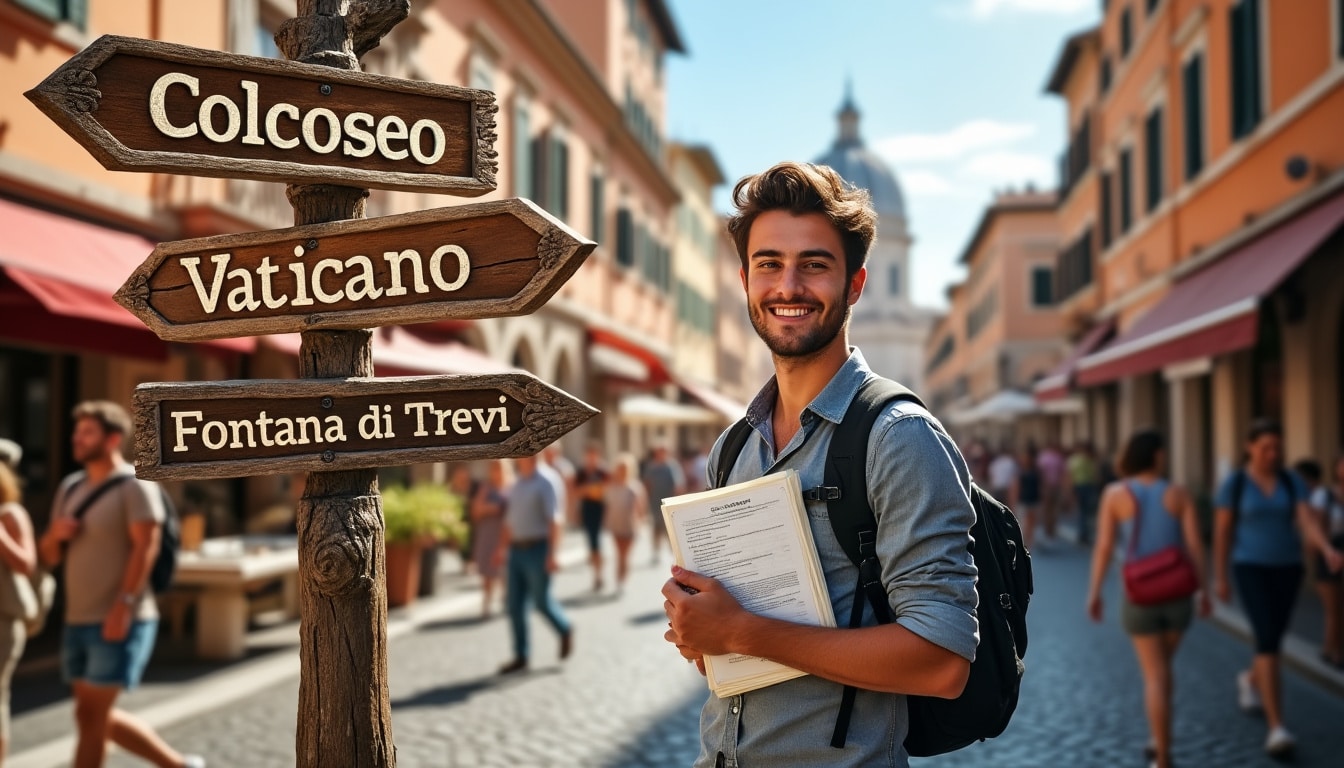If you’ve ever dreamt of indulging in the effervescent culture, exquisite cuisine, and historic elegance of Rome, you’re not alone. The Eternal City draws many with its allure, offering a lifestyle that’s both charming and vibrant. However, moving to Rome legally involves navigating an intricate mazelike system of visas, permits, and legal requirements. Whether your journey to Rome is fueled by career aspirations, academic pursuits, or the romantic allure of la dolce vita, understanding the legal frameworks is crucial to making your Roman dream a reality. In this guide, we delve deep into the necessary steps to make your move to Rome a seamless experience.
Understanding Rome’s Visa Options for US Citizens
To embark on a journey to Rome, one must first navigate the various visa options available. Each option is tailored to different life situations, be it for work, study, or retirement. Here’s a comprehensive look at the critical visa solutions available for US citizens planning to make Rome their home.

Types of Visas Available
The Italian Government provides an array of visas that can cater to different needs. These include options like the Digital Nomad Visa, which is particularly appealing for remote workers. To qualify, applicants must earn a minimum annual income and have health insurance coverage. Notably, this visa doesn’t allow one to work with Italian companies but facilitates a lifestyle where you can explore beautiful squares and piazzas while handling work from abroad.
For those considering retirement, the Elective Residency Visa might be an ideal match. It requires a demonstration of sufficient financial independence. With this visa, retirees can enjoy the delicacies of Italian cuisine and stroll down historic paths without the compliance of work obligations.
Other options include the Work Visa for those with job offers in Italy and the Student Visa, designed for those who wish to pursue education in Rome. Each type of visa involves specific requirements and processes. Ensuring you have the correct documentation, such as proof of lodging and financial means, is vital.
Navigating Visa Application Processes
The visa application process necessitates thorough preparation and familiarity with the bureaucratic path. Applications typically require you to schedule an appointment at the Rome Consulate or relevant consulate General, where you submit documentation such as a valid passport, visa application form, and specific financial statements that demonstrate your ability to support yourself.
Steps for a Successful Application:
- Gather all required documents, including a passport and financial proof 📜
- Schedule a visa interview with the consular office 🏛️
- Prepare for any additional interviews or assessments conducted by the Immigration Services
- Anticipate a decision time of several weeks before final approval ⏲️
The key is to be meticulous and patient, ensuring all legalities are fulfilled. This effort pays off in paving the way for a smooth transition to Roman life.
| Visa Type | Eligibility | Duration | Income Requirement |
|---|---|---|---|
| Digital Nomad Visa | Remote Workers | 1 Year (Renewable) | €24,789/year |
| Elective Residency Visa | Retirees/Passive Income Holders | 1 Year (Renewable) | €31,000/year |
| Work Visa | Salaried Workers with Job Offer | 1-2 Years (Renewable) | Dependent on Position |
| Student Visa | Accepted in Educational Institutions | 1 Year (Renewable) | Proof of Funds |
Navigating Roman Bureaucratic Processes and Permits
Once you set foot in Italy with your visa, the journey truly begins with securing a permesso di soggiorno, or residence permit. This permit is essential for a longer stay in Rome and involves a separate set of procedures post-arrival. The importance of understanding and executing these steps cannot be overstated, as they consolidate your legal status in Italy.
Securing Your Residence Permit
After arriving in Rome, applying for a residence permit is crucial within eight days. This process involves visiting a post office to pick up a “kit,” which contains forms necessary for your application. Here’s a detailed walkthrough:
- Collect the Permesso di Soggiorno Kit at a local post office 📬
- Complete and submit the application form 📝
- Provide crucial documentation, including your passport, visa, proof of accommodation, and financial means
- Pay necessary fees, usually between €100 to €200 💶
The residence permit validates your stay beyond the visa period, confirming your legal status to Italian authorities. This, along with the Codice Fiscale, assists in engaging with various facets of daily Italian life, from opening bank accounts to signing rental contracts.
Dealing with Italian Bureaucratic Systems
Rome’s legal services offer crucial guidance for newcomers navigating its complex bureaucratic landscape. Engaging with legal advisors in Italy can streamline the setup process, ensuring all documentation is accurate and submissions are timely. Collaboration with agencies specializing in International Relocation and European Union Immigration, like a reputable Work Visa Agency, can yield the expertise required to handle local regulations succinctly.
| Document | Purpose | Required For |
|---|---|---|
| Permesso di Soggiorno | Legal Residency | Stay Beyond Visa Duration |
| Codice Fiscale | Tax Identification | Banking, Contracts |
| Health Insurance | Medical Coverage | Visa & Residency Compliance |
The Nuances of Cost of Living and Housing in Rome
Understanding the cost of living in Rome is essential for planning effectively. Known for both its historical grandeur and vibrant urban lifestyle, the city incorporates varied expenses that potential expats should consider. Striking a balance between luxury and practicality is key as one settles into life in the Eternal City.
Monthly Expenses and Budgets
Rome, while bustling with culture and opportunity, can demand significant living costs, particularly within its more historical or trendy neighborhoods. Here’s an overview of typical monthly expenses:
- ⬆️ Rent: €900 to €1,500 for a one-bedroom city center apartment
- ⬆️ Utilities: €150 to €200 for gas, electricity, and water
- ⬇️ Groceries: Approximately €300 to €400 for basic necessities
- ⬆️ Transportation: About €40 for a monthly transit pass
- ⬇️ Internet: Around €30 to €40 for broadband services
Expenses will vary widely based on lifestyle choices and locations. While areas like Trastevere offer chic living spaces near cultural hotspots, they also come with premium rents. Alternatively, moving slightly towards the outskirts can offer more budget-friendly options while still preserving a short commute to the city’s core.
Housing Options and Finding the Right Abode
When it comes to selecting the ideal place to live, Rome provides a range of options from modern apartments in traditional settings to serene countryside villas on the city’s outskirts. Expats often look for places that offer convenience and comfort.
Key considerations when searching for the ideal residence include proximity to work or school, access to public transportation, and the vibrancy of local neighborhoods. Websites like Idealista and Casa work alongside local agencies that understand both the complications faced by newcomers and the intricacies involved in handling rental agreements.
| Expense Type | High Range (€) | Low Range (€) |
|---|---|---|
| Rent | 1,500 | 900 |
| Utilities | 200 | 150 |
| Groceries | 400 | 300 |
| Transportation | 50 | 40 |
| Internet | 40 | 30 |
Assimilating Into Rome’s Cultural and Social Fabric
Moving to Rome involves more than just logistics and financial planning; it is an opportunity to truly immerse oneself in the rich tapestry of Roman culture. As a city renowned for blending ancient history with modern flair, Rome offers diverse experiences awaiting exploration for those who choose to call it home.
Language and Communication
Language is the gateway to meaningful connections and smoother navigation of everyday life in Rome. While many Romans speak English, especially in business and tourist contexts, learning Italian opens new doors, whether in conversation, negotiation, or cultural immersion.
– Benefits include improved social interactions and deeper understanding of Roman customs.
– Resources such as language apps, Italian classes at community centers, and private tutors like those found on platforms such as Preply or iTalki can provide a head start.
Moreover, language is a significant element in Rome’s job market, particularly for roles that demand direct engagement with clients or locals. Engaging with the ever-welcoming Rome Expat Community through social media or local meetups is also an excellent way to improve conversational Italian and meet new friends.
Cultural Adaptation and Community Involvement
Integrating into the lively social environment involves embracing Roman traditions and becoming part of community activities. Participating in cultural events, frequenting local markets, and joining hobby groups allow newcomers to find common ground with locals and share in the celebratory spirit that typifies Italian culture.
- 🚶Join local walking tours to explore neighborhood stories
- 🛍️ Visit street markets to experience the hustle and bustle
- 🍝 Engage in cooking classes to learn traditional recipes
Rome Circuit offers delightful facts about Roman life, from language to demographic surprises. Falling in love with these subtleties enhances the experience of living in Rome.
Understanding Legal and Tax Implications for Expats in Rome
Relocating to Rome involves navigating legal and tax obligations as part of embracing a new life in Italy. The seamless integration into Rome’s legal framework ensures compliance with local laws, thus avoiding any pitfalls during your Italian journey.
Tax Responsibilities in Italy
The Italian tax system requires residents, including expats, to adhere to income tax requirements based on residency status. Engaging Rome Legal Services or Legal Advisors Italy specializing in expatriate tax services can help decipher complex tax policies and understand international tax treaties intended to prevent double taxation.
- 💼 Tax Residents: Must file an Italian tax return on worldwide income
- ⚖️ Non-Residents: Taxed only on Italian-sourced income
- 🗓️ US Reporting: Continue filing US tax returns, and potentially leverage the Foreign Earned Income Exclusion (FEIE) for tax benefits
Legal Assurance and Compliance
Staying informed about entry rules and legal compliance is crucial for every expat. Understanding Italian laws concerning business, property, and civil obligations can significantly affect those looking to build a lasting future in Rome. Seek professional advice, as correctly understanding immigration laws and staying aware of legal changes ensures a worry-free stay.
By acknowledging these frameworks, new Roman residents can approach life in Italy with confidence, ensuring each delightful day in this majestic city aligns perfectly with their legal endeavors.
FAQs About Moving to Rome
| Question | Answer |
|---|---|
| Can I work in Rome with a Digital Nomad Visa? | No, the Digital Nomad Visa permits remote work only with foreign employers. |
| How important is learning Italian in Rome? | While English is common, learning Italian assists in easier integration and broader job opportunities. |
| What are the healthcare obligations for expats? | Expats must hold private health insurance unless eligible for public healthcare through employment. |
| Is it easy to navigate Roman public transport? | Yes, Rome has a comprehensive transit system covering buses, trams, and metro services. |
| Are housing costs high in city centers? | Yes, central areas like Trastevere come with premium rents, but options exist in more economical neighborhoods. |

